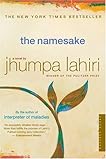 The Namesake by Jhumpa Lahiri
The Namesake by Jhumpa LahiriMy rating: 2 of 5 stars
The Namesake follows an Indian-American from birth through middle-age. The focus is on his relationships with his parents and how that affects his attitudes towards life and relationships, and the outcome of those relationships. The McGuffin in the book is his naming, which was planned to be done in a traditional manner but complications prevented that from happening.
One of the things to remember is that as immigrants, the principle's parents had choices on how to engage their new world. His father chooses to engage in it as a professional, but not any further. His mother chooses not to engage, and withdraws into remembrances of home. And as an arranged marriage, there is no reason to expect that his mother has the same ability to adapt that his father showed as a graduate student in the United States. The cliche is that his parents inability to causes problems in his ability to relate to his world, in particular his relationships which capsize because he lacks the ability to adapt the bigger and more varied worlds of his partners.
So the question is: was he doomed because of his parents? His sister seems to do well, which his mother observes in her not-so-traditional marriage as compared to his traditional one. Or are there choices he makes, like his hangups on his name, both the originally given one and the formal one that he has claimed as his own. He spends much effort trying to flee his background, and conforming to its surface for the sake of his parents, both his efforts to avoid his background and the compromises he makes to conform lead to tragedy.
Many books of this type seem to have as their point the need to let the American born child go (e.g. the protagonists sister who goes far away from home for school, but ends up much better adjusted and even closer to their mother.) But I would claim that it is still his choice on how he chooses to engage in the world. For all their hopes that their children follow traditional (home) ways and their complaints when their children do not, most immigrant parents in the end are satisfied with children who maintain relationships with them when they are grown, a truism that is implied in the protagonists sister and her fiancee at the end of the book. The conflicts and separation in the interim is more of a tragedy then anything else, and is magnified by the protagonist's repeated dwelling on issues of his name and background.
The other theme is on relationships. In particular the unbalanced relationship where one person has a more adventurous history then the other and the less adventurous one has no desire to partake in the expansive life of the other.
The book is good in the sense that it has a lot of material, and it has an honest feel to it. But there is a lot of conflict avoidance. Certainly on the part of the principal characters, and maybe on the part of the author as well. It is very hard to write good characters when a big part of their personality is avoidance, even though lots of authors seem to try (because it is angsty and it has the appearance of depth) But the whole thing suffers because as a reader who recognizes the situations, I can see the issues, but they are not dealt with in the narrative.
View all my reviews >>
No comments:
Post a Comment